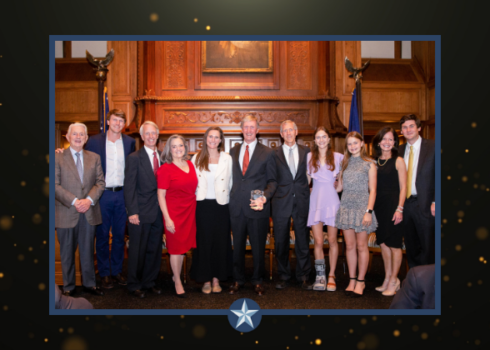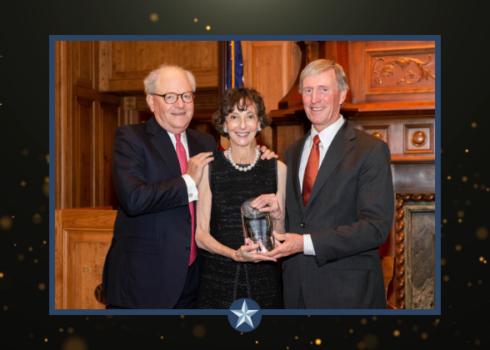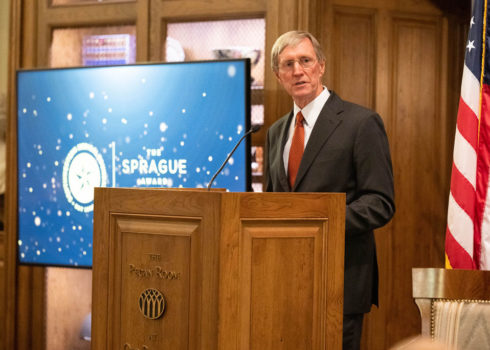Maureen and Robert Decherd are shaping the future of Dallas with purpose and passion. In 1993, the couple established The Decherd Foundation, which partners with various charitable organizations to further education, health care, and community development. This generous family has provided unwavering support for Southwestern Medical Foundation through various funds, campaigns, and chairs to sustain innovation in brain discovery and best-in-class medical research at UT Southwestern. Mr. Decherd also serves as Board Chair of Parks for Downtown Dallas, which seeks to stimulate and maintain a vibrant environment and promote community involvement of Dallas’ city parks. The impact of the family’s kindness will be felt for generations.
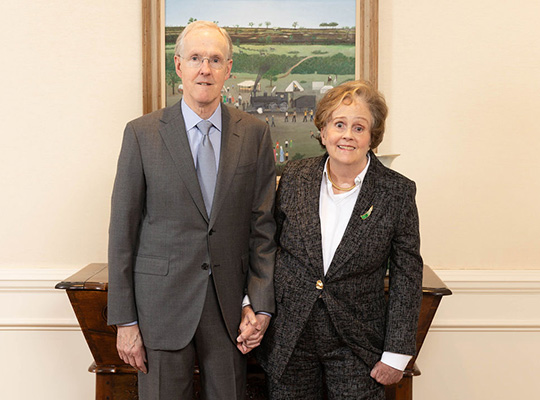
Through their collaboration with Southwestern Medical Foundation, they created the Decherd Family Fund for Medical Research, The Decherd Family Fund to Support the Parkland Memorial Hospital Neuro-Trauma Award, the Maureen H. Decherd Fund for Neurosurgical Innovation, in Honor of Duke Samson, M.D., and the H. Ben and Isabelle T. Decherd Chair in Internal Medicine. Their generous gifts have helped fund various giving areas, including the Campaign for the Brain, neurosurgery and neuro-trauma, internal medicine, Dr. Robert H. Collins Laboratory Fund for Leukemia Research, the George N. Peters, M.D. Center for Breast Surgery Fund, the Harold B. and May E. Sanders Scholarship Fund, and the Pollock Family Center for Research in Inflammatory Bowel Disease. In addition, Mr. Decherd served as Chairman of the leadership committee of the Campaign for the Chairs, a successful $21 million fundraising campaign that endowed 28 new Distinguished Chairs at UT Southwestern.
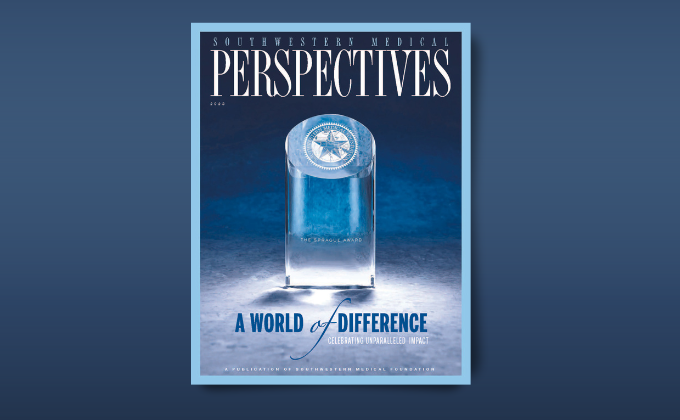
A World of Difference – Celebrating Unparalleled Impact
Read the 2023 edition of Southwestern Medical Perspectives featuring all three of the 2022 Sprague Award honorees and their incredible impact on medical progress. Also in this issue, we celebrate 50 years of collaboration at UT Southwestern with two Nobel Laureates, Michael S. Brown, M.D., and Joseph L. Goldstein, M.D.
Read MoreMeet Maureen and Robert Decherd
A Dallas native, Mr. Decherd discovered his passion for journalism while a student at St. Mark’s School of Texas, where he was editor of the school newspaper. He then attended Harvard, where he served as President of The Harvard Crimson and Orator of his class. He earned a degree cum laude in general studies at Harvard with a concentration in history. Mrs. Decherd was born in Temple, Texas, the first of seven children, and her family later moved to Dallas. She earned an undergraduate degree in English from The University of Texas at Austin.
The Decherds had been old friends in high school and reconnected at a wedding while home during college. After graduating, they began a life together in Dallas, where Mr. Decherd’s career in newspaper would span almost 40 years. He served as chairman, president, and CEO of DallasNews Corporation, the holding company of The Dallas Morning News.
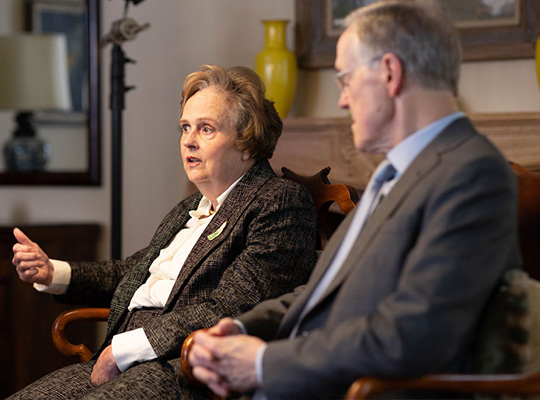
The couple cherishes their 47-year marriage and is proud that their children, William and Audrey, have grown up placing family and friends first in their lives. After graduating from the Episcopal School of Dallas, William graduated from Harvard University and earned an MBA from Stanford School of Business. He is a Partner at McKinsey & Company, a global management consulting firm in Dallas.
Audrey graduated from The Hockaday School and earned a BA from Vanderbilt University, but a traumatic event in 2007 would change the course of her life. One day while Audrey walked with her mother in the neighborhood, Mrs. Decherd was struck by a car and suffered a traumatic brain injury. For the next three months, Audrey spent many hours at her mother’s hospital bedside, witnessing the compassion and tenderness of the intensive care nursing team. The experience awakened a deep desire to serve others, and she went on to earn a Master of Science in Nursing from UT Austin. Today she is a neonatal intensive care nurse at Baylor Scott and White in Dallas.
Grateful for life, Mr. Decherd shares his thoughts on the importance of philanthropy and giving back to the community.
Robert Decherd Q&A
Q: How do you go about choosing a cause or an organization to support?
Mr. Decherd: This is instinctive and reflects our core beliefs about society, fairness, and right and wrong.
Q: You are great champions of education. Can you please explain the role that education has had in your own lives?
Mr. Decherd: Education draws out a person’s natural talents and empowers the person to make good decisions in varied situations. Higher education, especially, enhances one’s ability to think critically about complex matters.
Q: Robert, you have been referred to as “a permanent beacon of freedom of information” – why is free speech important to you?
Mr. Decherd: Free speech and distinguished journalism are one and the same. Without them, our democracy does not work. The United States is the greatest democracy in the history of the world, and its success in years to come depends on our citizens having access to all of the information that informs government, the justice system, and an engaged electorate.
Q: What do you see in the future in terms of UT Southwestern Medical Center’s importance to our state?
Mr. Decherd: UT Southwestern now, in the breadth of its resources and the talent and expertise that exists institutionally, influences and impacts health care, society, and how the state evolves. The School of Public Health opening this year will be a tremendous asset to our region, and it has only been made possible through the type of cutting-edge research and care UT Southwestern is leading. UT Southwestern Medical Center at RedBird opened in August 2022. This newest regional medical center makes accessing state-of-the-art health care convenient for families in Southwest Dallas. UT Southwestern physicians provide care in more than 80 specialties, overseeing nearly four million outpatient visits a year. We have great medical institutions in the major cities in Texas, but none are as good as UT Southwestern.
Q: Your daughter was inspired to pursue an education in nursing after witnessing the care Maureen received in the hospital after her accident. Describe the importance of the nurse’s role in patient outcomes and recovery.
Mr. Decherd: Anyone who has experienced a severe injury or illness, and is either hospitalized or is subsequently an outpatient, intuitively understands that the quality of nursing care is extraordinarily important. This is particularly true with an injury like Maureen’s and the amount of time she was in the hospital, as well as the amount of effort required afterwards in physical therapy. Nurses get their patients to physical therapy, and without great nursing care, the patient’s ability to remain optimistic, spirited, and determined is lessened. There is no substitute, and thankfully, Maureen has had that from the outset.
Q: Your family has generously supported the Parkland Memorial Hospital Neuro-Trauma Award Honoring Duke S. Samson, M.D, Jim Thornton, M.D., and Babu Welch, M.D. What does this award mean to you?
Mr. Decherd: This award recognizes the fact that Drs. Samson, Welch, and Thornton were the first medical people who embraced Maureen after her accident and stuck with her and us, all the way through, even to this day. Dr. Samson conceived this award to recognize the larger trauma team—the physicians, nursing staff, and their support staff—who make a trauma unit successful in terms of the expertise of frontline workers and patient outcomes. Health care workers who encounter patients with severe and life-threatening injuries or strokes must work proficiently and quickly as a team, and they must be willing to take calculated risks because they don’t know what the course of an injury or a stroke might be. Parkland is one of the great trauma hospitals in America, and this annual award celebrates a faculty member or frontline member on Parkland’s Neuro-Trauma team who demonstrates his or her importance to the survival and continued wellness of their patients.
Q: Robert, you are deeply devoted to city park projects. What is your vision about the need for reshaping downtown Dallas through green space and beauty?
Mr. Decherd: The cliche “great cities have great parks” is a truism. Until now, Dallas did not have great parks in its downtown core. This limited the city’s ability to have a dynamic residential presence downtown. By helping build 23 acres of parks downtown in less than 20 years, Parks for Downtown Dallas and its partners have fundamentally changed the long-term arc of Dallas’ center city for the better. The resultant growth in the city’s tax base creates a larger revenue stream that future city councils can direct to needs in every part of Dallas.
Q: What advice would you give to a young person who wanted, as you have, to make his or her community a better place?
Mr. Decherd: As society evolves over a long period of time, it is incredibly important to find ways to draw together people of diverse backgrounds, different interests, different predispositions, and as I have often said, find the middle where most people prefer to learn. For that to work, you must have the most capable men and women who have the interest and the talent, and perhaps the resources, to become engaged in a way that creates an environment where people can come together. Without that engagement, it will never happen. So it is not a matter of resources, but a matter of conviction, talent, the willingness to give of your talent and frankly, a sense of optimism about how we can improve the lives of all of our fellow citizens and create a community of the highest order.
Q: What does it mean to you to be honored with The Sprague Award?
Mr. Decherd: Charlie Sprague did such a remarkable job leading UT Southwestern in its early years, so it’s an honor to receive an award named after him. This award means a lot to us both on a personal and civic basis. We aspire for our city, our county, and our state to be a place that accommodates everyone, where there is a common understanding of why as a society, we need to look out for one another. Health care is central to that.
